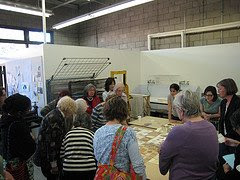
Those of us who work with and for boards inevitably amass a pile of good, bad and ugly meeting stories. We could write a book! Today, though, I thought I'd focus on the positive aspect of board meetings and try to answer the rest of the 'I know I've had a successful board meeting when...' sentence. I hope you try to answer it as well and send your thoughts along to me.
I know I've had a successful board meeting when
- the bulk of our time together is spent on strategizing how to gain the greatest impact from our work, and
- everybody (or nearly so) gets the opportunity to participate
I've come to this conclusion because I've sat through some (alright, many) meetings where the agenda is not much more than a series of updates given by one or two people (including myself!). Those meetings tend to be pretty lifeless and, frankly, don't make good use of the talent, insight and intelligence of the people around the table.
My successful board meeting takes some effort to accomplish and I have to admit that, as a director, I don't accomplish it every time. But, here's my short list of ingredients that I think ought to go into making the meeting both substantive and lively:
- keep the verbal reports of past activities to a minimum. If you must talk about past activities, couch the discussion in the form of an issue to be resolved or simply ask how the activity can make a greater impact.
- introduce topics on the agenda in the form of questions. For example, instead of a building committee report, ask something like "Should a cyclical maintenance plan be developed to help us stay on top of the property's needs? If so, how can we make it a useable and user-friendly plan?" Instead of a report on the number and type of visitors, why not a look at a graph of visitation over several years and ask the question "What trends do we see in visitation and what are their impacts on our work?"
- prep some board members to talk. For example, when you call or email Mary, say "Mary, because you've been working with the membership program, I know that you've got some insights to share about it. I'm going to ask you at the board meeting to say a few words about what you're seeing."
- discuss with the board president beforehand how best to facilitate discussion. I try to address this with my board president when developing the meeting agenda.
- view every meeting agenda as a clean slate. Sure, there are reoccurring items, but don't consider the agenda as a rote list of reports (you know, same list, different date) -- it can be so much more than that.
- consider mixing up the activity. Now here's an interesting idea -- break into small discussion or work groups for a portion of the meeting. This strategy gets people off their duffs and interacting with others whom they may not know well (or at all). It encourages everybody to engage and talk (larger groups don't encourage that so well). And it offers the opportunity for ideas to take shape.
OK. This is no small task. But if you buy into the need to shake things up at your next (potentially boring) board meeting, try just one or two of these suggestions. See if you notice a difference. If you do, ask the group if they do, too. Changing board habits can be glacial -- but, it will never happen if the first small step isn't taken.
Photo: LAPS board meeting at CSUN by ms sherwood


Comments